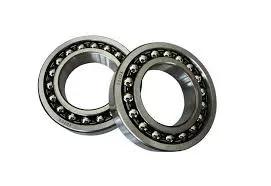
Dec . 21, 2024 02:21 Back to list
why are ball bearings used in machinery
Why Are Ball Bearings Used in Machinery?
Ball bearings are vital components widely used in various types of machinery across different industries. Their primary function is to reduce friction between moving parts, which is crucial for enhancing the efficiency, performance, and lifespan of mechanical systems. This article will explore the reasons for the extensive use of ball bearings in machinery and some of their fundamental characteristics.
The Mechanism of Ball Bearings
At their core, ball bearings consist of a set of balls held in place by a cage or retainer between two rings known as races. The design allows the balls to roll smoothly, easing rotational motion between the parts of the machinery. This rolling motion considerably reduces the amount of friction compared to sliding surfaces. By minimizing friction, ball bearings facilitate smoother operation, lower energy consumption, and reduced wear and tear on components.
Reducing Friction and Wear
One of the primary reasons for the use of ball bearings in machinery is their ability to drastically reduce friction. When machinery parts move against each other without any intermediary component, the friction generated can lead to overheating and, subsequently, failure. Ball bearings act as a barrier, allowing for smooth rolling motion, which in turn minimizes heat generation. This reduction in friction not only prevents damage to the moving parts but also lowers the operational costs associated with maintenance and repairs.
Enhanced Efficiency
In industries where machinery efficiency is paramount, ball bearings play a crucial role. They enhance the overall performance of machines by allowing them to operate smoothly and more efficiently. For example, in electric motors, the use of ball bearings ensures that the rotor can spin freely, maximizing torque and power output. This increased efficiency is vital in applications ranging from automotive engines to industrial machinery, where even slight enhancements can lead to significant economic benefits.
why are ball bearings used in machinery

Load Distribution
Ball bearings are designed to carry and distribute loads effectively across their surfaces. They can accommodate both radial loads (perpendicular to the shaft) and axial loads (along the axis of rotation). This versatile load-bearing capability makes ball bearings ideal for various applications, including heavy machinery, conveyor systems, and automotive components. By evenly distributing stress, ball bearings help prevent premature failure and extend the lifespan of machinery.
Versatility and Adaptability
Another significant advantage of ball bearings is their versatility. They come in various sizes and types, making them suitable for a wide range of applications. Manufacturers can choose between different materials, such as steel, ceramic, or plastic, depending on factors like operational environment, load requirements, and temperature conditions. This adaptability allows for customization in design and function, making ball bearings an integral part of countless devices, from tiny electric motors to large industrial machines.
Noise Reduction
In addition to improving efficiency and reducing friction, ball bearings also contribute to noise reduction in machinery. Sliding surfaces can create significant noise, which can be both distracting and harmful in certain environments. The smooth rolling motion of ball bearings minimizes vibration and noise levels, contributing to quieter operation. This aspect is particularly important in consumer products like appliances and fans, where noise can be a considerable concern for users.
Conclusion
In conclusion, ball bearings are essential components that contribute to the efficiency, durability, and overall performance of machinery. By reducing friction, distributing loads, and minimizing noise, they play a critical role in enhancing the functionality of various mechanical systems. Their versatility allows them to be utilized in a broad spectrum of applications, from household appliances to large industrial machines. As technology evolves, the importance of ball bearings in machinery remains steadfast, continuing to support industries worldwide through improved reliability and efficiency.
Latest news
-
Grooved Ball Bearing Design and Functionality
NewsJun.04,2025
-
Concrete Mixer Bearing Load Capacity Testing
NewsJun.04,2025
-
6004 Bearing Dimensions in Robotic Joint Designs
NewsJun.04,2025
-
Advantages of Single-Row Deep Groove Ball Bearings
NewsJun.04,2025
-
Applications of Deep Groove Ball Bearings in Automotive Systems
NewsJun.04,2025
-
Innovations in Bearing Pressing Machine Design
NewsJun.04,2025
